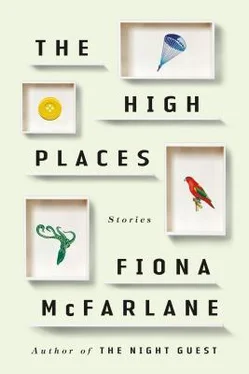Eric and I parted in town. He made no reference to the doctor, but also no promise of a lift back to the school. I walked through the sandy streets to the end of the beach farthest from the dock, observing the population as I myself was no doubt observed, and I hoped that once I left the island I would never see a place like it again in my life. I longed for escape. The supply ship sat smugly in the harbour, equipped with its doctor, and I was tempted to board it waving a white flag. But who then would free Mabel? If she doesn’t belong to God, she belongs nowhere. I must remember to write that into my grant report.
I thought I might find Darwin on the beach, but I found the protesters instead. They talked in groups in the extended shadows of the palm trees. I walked toward them with my hands in the pockets of my trousers, and when they saw me coming they stirred with hope and indignation. I stopped a few feet from them, and despite the failing light they peered up at me with their hands cupped over their eyes, as if the absurd sun of the island’s midday had forced them into a permanent habit.
‘Good evening,’ I said.
‘Hi,’ they chorused.
A blond boy stood, handsome, a kind of voluntary Achilles. He advanced toward me. ‘Maybe you can help us,’ he said. He seemed to be wondering aloud. A ripple of assent went through the group: Yes, yes, they seemed to sigh, maybe he can help us.
‘I hear you’re looking for transportation,’ I said.
‘Do you have a car? Even better, a truck?’ said the boy.
‘A bus?’ called one wag, and they laughed.
‘Where is it that you’d like to go?’
‘We need to get to the other side of the island,’ said the boy. ‘Do you know of a scientist, a Dr William Birch?’
‘Bill Birch, yes. Sure I do.’
‘And you’re not him?’
‘Me? I’m no scientist,’ I answered, and for some reason they all laughed again, perhaps in relief. The boy began to explain to me that he — they — objected to the work Dr Birch was doing with a certain captive squid. He was guarded, but furious. They’d all been together on some kind of ecology project in the Cook Islands when news of Dr Birch’s work broke, and had talked their way onto the supply ship.
‘That was only three days ago,’ the boy said, with pride. ‘We’re here before the media.’
‘So you want to get to Dr Birch,’ I said.
‘No one seems to know where he is,’ said the boy. ‘It’s like he’s a hermit or something.’
It thrills me to know the locals protected me from that lovable, good-looking, deluded band.
‘I know where he is,’ I said, ‘and I’ll do what I can to get you to him.’
They rose up as one then, and surrounded me with their relief and zeal, shouting names at me and asking mine.
‘Eric Anthony,’ I said. ‘Now tell me, what would you have said if I’d been Dr Birch?’
‘We’d have said we were marine biology students,’ said Todd, the Achilles. ‘Who wouldn’t want to see a colossal squid if they had the chance?’
And they asked me to take a photo of them, all together on the beach; it was a beautiful picture, sand-lit, and they pressed together inside its frame with such health and trust that I wanted to — I did — like them, very much. And I knew they would help me if I asked them to; they would swim out across the bay, they would remove the net, they would farewell Mabel with me, sending her seaward, and every second of her escape would be captured on their phones. Mabel would swim forever in a digital sea. She’d be free, but all the world would know her.
In town, I had more luck than they had finding transportation. I paid for the use of a utility truck owned by a friend of Eric’s and the crusaders climbed into the tray with their knapsacks. I even bought them supplies and checked the batteries in their torches. The townspeople watched us. Again, it pleased me to think that the only person they would betray me to was myself. Todd rode in the front with me. He asked what I did on the island and I told him I taught in a Catholic school near Dr Birch’s camp. I told him we would pass the school and that they should walk up to visit me there whenever they needed to get into town. He asked if I lived at the school, and I said yes. He asked if I was Catholic, and I said yes. This all came very easily. Todd is an earnest and admirable young man. I’d be proud to have a son like him. But he plays no part in my vision of freeing Mabel, and my principal concern was to cause him as much inconvenience as possible. To accomplish this, I dropped him and his cheerful gang at the head of a trail leading to a beach a few bays east of my observation station and told them that Mabel, far from being trapped in a small inlet, was enclosed by the coral reef and had the whole lagoon to move around in.
‘Don’t go swimming,’ I said. ‘She’s probably pretty angry by now.’
‘Are colossal squid dangerous?’ asked Todd.
‘Deadly.’
I told them Bill Birch moved his camp from place to place in the jungle, so they might have trouble finding him at first. I said that he was essentially harmless, that the machete he carried was only for cutting paths; I warned them too that he was hard of hearing and jumpy when startled. I said I knew they were responsible kids and would act with appropriate caution. We unloaded their gear onto the road. I moved the truck so the headlights shone down along the trail. They remarked on the audible ocean and seemed much less nervous than they should have been; they said goodbye, they expressed their gratitude, and then they plunged off into the humid trees. When they were far beyond the beam of my headlights, Darwin bounded onto the road like a stricken kangaroo.
‘There you are,’ I said.
He climbed into the truck and sat rigidly, like a boy waiting for a roller coaster to descend its first hill.
‘You’ve never been in a car before, have you?’ I said.
He shook his head. I gave him quite a ride. There are some hairpin bends on this old volcano that can knot your intestines like a skilful sailor. By the time we got back to the observation station, we were both giddy as schoolboys. We walked out onto the cliff and looked down at Mabel. It was dark, of course, and colossal squid are not, to my or anyone’s knowledge, phosphorescent, but I would be willing to swear that I saw her outline glowing very faintly from the bottom of her bay.
That was last night. I slept late this morning, day 498, and spent the afternoon writing this account. Now Darwin is with me, and it’s pleasant to see him in the fullest light of the day; he seems more definite and in this way more ordinary. The weather is clear, so we amuse ourselves by pretending we can see New Zealand. I don’t know what’s become of Eric; I don’t know what report he’s given Father Anthony. No one has come looking for me. I imagine the supply ship has left by now. I imagine I’ll spend the next month in town living on this newly discovered goodwill of the locals, just another oddball wanderer. The protesters will find me, eventually, and we’ll make friends; we’ll laugh together when they hear what it is I’ve done, and one of the girls, less pretty, perhaps, but kind, will take pity on me. I’ll resign my position, of course. I’ll take the next ship; I’ll go home. Darwin says he won’t come with me. He’s scornful of Australia and talks of England with the adoration of exile. This is all as it should be. Unless, unless, I get too close to Mabel, and she takes me with her.
In these last few minutes I’ve felt the swimmy brimming that precedes an attack of vertigo. I feel it as a pressure in my feet. Soon, I know, the earth will fall away from them, and this too is as it should be. My head seems to press outward. To myself I say, Shark, anemone, starfish, seahorse, eel . My main concern was that if Eric raised the alarm, Father Anthony wouldn’t permit the girls to take their daily swim. But here they come now, down the mountain. They’re singing, of course, and Faith is among them. She’s singing softly. She likes to swim. She’ll wade out into the water and the other girls will follow her. What is it about being immersed in water that’s so exciting, so vital to us? We all experience it — this thrill of feeling the medium we move in as something dangerous and contingent. It reminds us of the artifice of oxygen and gravity, the sheer unlikelihood of their provision. We feel the water close around our arms and legs and we make our way through it with difficulty and determination, singing and proclaiming and making promises, kneeling and rising and sitting and standing. It feels like the unbearable presence of God, His hands on our submarine chests. A blowfish might waft past, inflated, with a look of dumb surprise on its face. I have basketfuls of fish ready to feed to Mabel. The girls will take hold of the net; I’ll watch as they rise through the sea with it into the air. The light will billow and flare around them in the bright wind, and their hands will reach out to Heaven as if strung on trapeze wires. I’ll wade through the shallows, wet to my stupid waist, then I’ll kick downward and swim. Darwin will observe from the shore in his nineteenth-century socks. And Mabel will fly seaward, holy and beautiful, a bony-beaked messenger bringing no news.
Читать дальше












